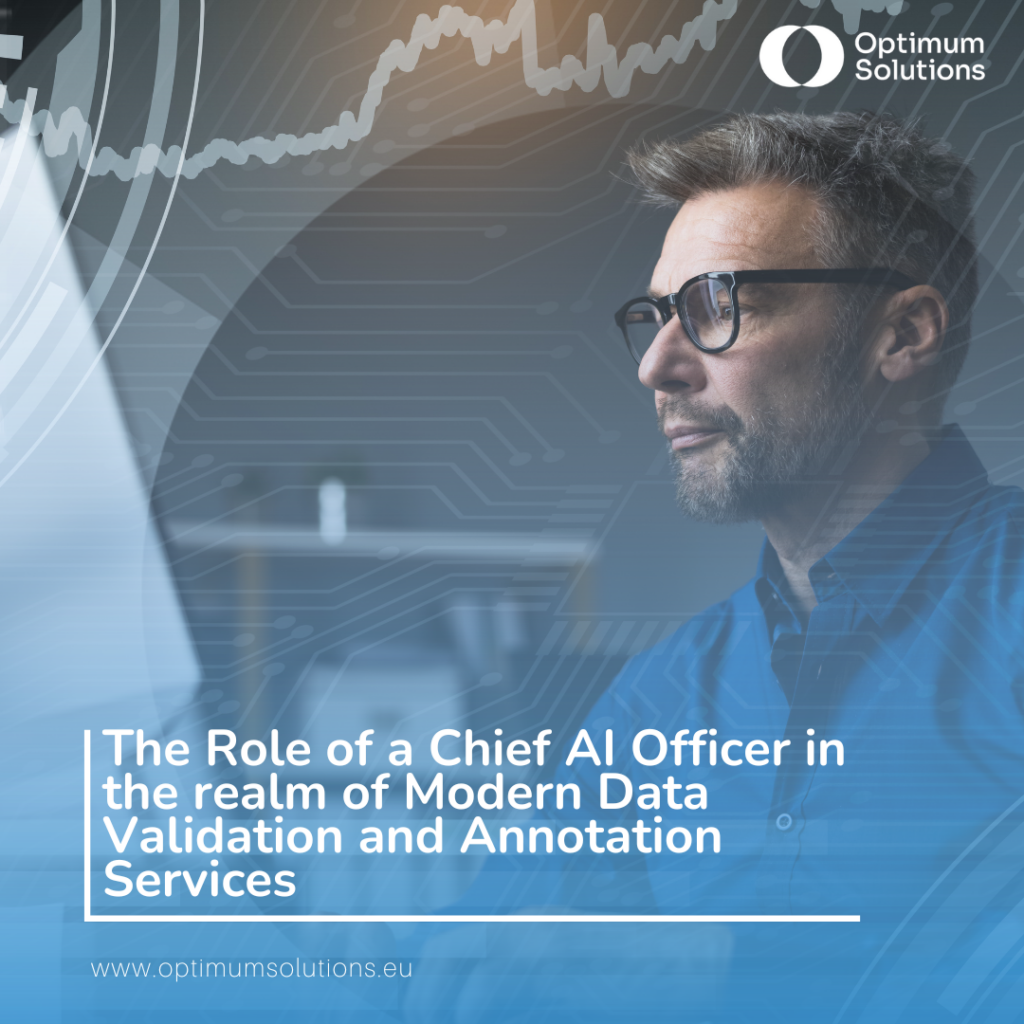
In today’s data-driven world, the Chief AI Officer (CAIO) role has become pivotal, especially for businesses involved in data validation and annotation services. As these services are increasingly vital in ensuring accurate, scalable, and AI-powered solutions, having a dedicated CAIO to lead the charge is crucial. With AI now central to business strategy, the CAIO has emerged as a key figure driving transformation in this complex and evolving field.
In this blog, we explore the role of the Chief AI Officer and why having a dedicated CAIO is crucial for businesses navigating the complex realm of AI. As AI transitions from a side project to the heart of business strategy, the CAIO emerges as the key player in this transformative journey.
Crafting an AI Strategy Aligned to Data Services
One of the main responsibilities of the CAIO is developing an AI strategy specifically tailored to data validation and annotation. This involves evaluating use cases, auditing the company’s data assets, and implementing the right technologies to enhance accuracy and efficiency. The CAIO ensures that the entire data pipeline, from collection to validation, is streamlined for AI integration, providing oversight to prevent fragmented projects and to drive cohesive, large-scale AI initiatives. Companies in the data annotation sector are increasingly recognizing the necessity of AI expertise at the executive level.
Driving AI-Enhanced Data Validation and Annotation
Scaling AI across various stages of data annotation—labeling, categorization, and validation—presents unique challenges. The CAIO plays the role of an evangelist, pushing for AI adoption across departments, ensuring that AI solutions improve accuracy, reduce human error, and speed up data processing. By communicating the benefits of AI-driven tools and fostering a culture of collaboration, the CAIO helps organizations leverage AI to maintain high standards of quality in their services.
Managing Ethics, Risks, and Governance in AI-Powered Data Services
Data privacy and algorithmic bias are critical concerns in data validation and annotation, and the CAIO is responsible for ensuring that AI systems are ethical and compliant with regulations. The CAIO establishes frameworks for data governance, model evaluation, and continuous monitoring to guarantee that the services provided meet legal and ethical standards. This is especially important in fields such as healthcare and finance, where data sensitivity is paramount. By taking a proactive approach to governance, the CAIO helps companies minimize compliance risks while maintaining trust with clients.
Building Strategic AI Partnerships in the Data Sector
In the rapidly evolving world of AI and data services, collaboration is key. The CAIO builds partnerships with academic institutions, technology vendors, policymakers, and startups to stay at the forefront of innovation. These collaborations allow businesses to tap into cutting-edge AI technologies and methodologies, making their data annotation processes more efficient and effective. The CAIO’s network becomes a strategic asset, enhancing the company’s ability to deliver superior services.
Recruiting and Developing AI Talent for Data Annotation
Building a robust AI-driven team is a top priority for the CAIO. For businesses specializing in data validation and annotation, attracting talent with expertise in AI, data science, and related fields is essential. The CAIO identifies the necessary skill sets, from data annotators to AI engineers, to create a team capable of developing AI models that improve the accuracy and efficiency of data processing. By nurturing a culture of innovation and AI excellence, the CAIO positions the company as an industry leader in modern data services.
Insights and AI Strategy for the C-Suite
The CAIO serves as a vital link between AI initiatives and the broader business strategy. By providing insights into how AI can enhance data validation and annotation, they ensure that the company remains at the cutting edge of innovation. As businesses increasingly depend on AI to handle large-scale, complex datasets, the CAIO helps executives identify areas where AI can make a meaningful impact—particularly in automating manual data processes and scaling operations efficiently.
Conclusion
In the fast-paced world of modern data validation and annotation services, the Chief AI Officer is no longer just an asset—they are a necessity. With a unique blend of commercial insight, technical expertise, and leadership skills, the CAIO is at the center stage of AI-driven transformation. If you’d like to learn more about the role of a Chief AI Officer in modern data validation and annotation services, schedule a free digital coffee through this link: https://calendly.com/lucoptimum/onlinecoffee.